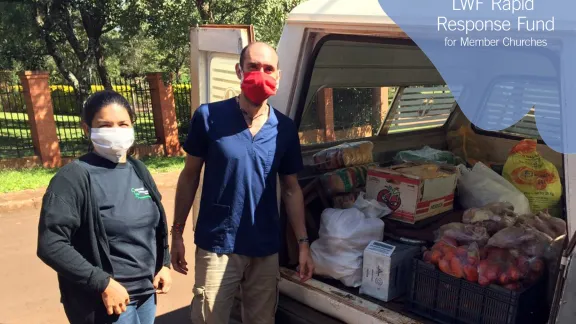
IERP distributes hot lunches, food and sanitation items
(LWI) – When Argentina declared a national quarantine, restricting movement and suspending all public activities on 20 March to contain the spread of the coronavirus disease (COVID-19), the Evangelical Church of the River Plate (IERP) was especially concerned about the indigenous Mbyá Guaraní communities in the northeastern province of Misiones.
The Lutheran World Federation (LWF) member church was aware such necessary measures would make life more difficult for already vulnerable populations, whose survival largely depends on contact with other towns in the province. The Mbyá inhabitants of the Ruiz de Montoya municipality, mainly make a living from labor in informal sectors outside their communities and income based on state programs. They have little access to nutritious food, health and sanitation.
Through its congregation in Ruiz de Montoya, the IERP increased the focus of its long-standing diaconal work there to include prevention of the spread of COVID-19 as the church looked for additional funds. The work of Hora de Obrar (“Time for action”)--the IERP foundation for diaconal work--was expanded to include distribution of food items and sanitation material, awareness raising and collaboration with the local health center. This would ensure 100 indigenous families and other vulnerable households in the municipality receive assistance.
Lutheran communion solidarity
The IERP is among 33 churches that by mid-May had received funding from the LWF COVID-19 Rapid Response Fund (RRF). The fund, launched in April, will support many of the communion’s member churches that are particularly vulnerable during the global health emergency. Upon approval of a project application, a church can receive a grant of up to EUR 5,000 from the global fund supported by LWF’s member church partners around the world.
“This assistance is important because vulnerable families can fulfill their basic needs in a context where economic activities, transportation and access to services are paralyzed,” says IERP diaconal practitioner Fabián Dinamarca, who is responsible for Hora de Obrar programs and projects.

Hora de Obrar field team and the Mbyá leader and health promoter Juan González distributing food and sanitation items in Tupambaé community in Ruiz de Montoya, Misiones, Argentina. Photo: Arsenio Franco
The LWF funding will also augment the local fundraising efforts of the Argentine church diaconal institutions, community centers and congregations to provide emergency food and sanitation items to more than 1,100 families in disadvantaged urban neighborhoods.
According to the World Health Organization, Argentina, with a population of 44 million people, had recorded 8,068 COVID-19 cases by 19 May, including 373 fatalities.
The quarantine has resulted in significant job losses, and 11 million people have applied for state emergency assistance. They receive around USD 140 dollars or as low as USD 100 considering the influence of the informal financial market, Dinamarca says. “Most people have not yet received the first payment and the latest news is that the government plans to complete the first disbursement until the end of May, and launch a second one from June onwards,” he adds. For the church’s diaconal context, this translates into “lack of the most basic needs among many families.”
Weekly hot lunch
While learning in Argentina’s public schools is still suspended to contain the coronavirus spread, the Takuapí indigenous school, which the IERP established in 1995, stands out as an important expression of diakonia during the COVID-19 crisis. Five days a week, from Monday to Friday, nearly 100 children and elderly people from the community receive a hot nutritious lunch prepared in the school kitchen by local women.

At the IERP’s Takuapí indigenous school, children and the elderly receive a hot nutritious lunch prepared by local women. Photo: Hilario Acosta
“These efforts help to ensure that people stay in their communities and reduce unnecessary contacts in town, which will go a long way in preventing the spread of the virus,” Dinamarca says.
The additional support from LWF's RRF enables the Misiones province IERP’s Hora de Obrar field team and Takuapí school staff to boost their food distribution and sanitation item supplies beyond the targeted 100 indigenous families. “Thanks to this solidarity, we have been able to reach other communities in need. Luckily, so far, no COVID-19 cases have been reported among the Mbyá communities,” Dinamarca adds.
The LWF has been supporting IERP’s diaconal work among indigenous people in Argentina for several years. The RRF support will cover an emergency period of six weeks.
With input from Fabián Dinamarca, IERP diaconal practitioner.


